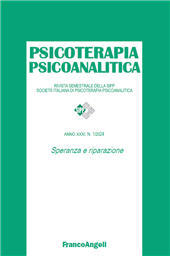La speranza, tra ideali e realtà
P. 114-122
L'autrice, considera cosi come altri autori, che la speranza sia alle origini di ogni percorso psicoanalitico e che la sua tenuta sia fonda-mentale nel processo terapeutico, così come già aveva annunciato Freud in un suo scritto del 1890. Tuttavia ella si domanda perché in questo momento la psicoanalisi abbia bisogno d'indagare questo termi-ne e tenta in questo breve lavoro, di offrire una riflessione a riguardo. Prende in considerazione il veloce cambiamento epocale che si sta attraversando nel sociale e quanto sia difficile mantenere una sana illusione, combattere le idealizzazioni e creare la fiducia alla base della speranza, ma anche quanto sia alto il rischio di cadere nell' ipocrisia professionale di cui ha parlato S. Ferenczi.
Viene riportato una breve vignetta clinica per esemplificare momenti difficili di perdita e rinnovata speranza, percorsi bui tra fari e miraggi in cui la speranza si propone come un'attesa laboriosa, un'attesa fiduciosa e pronta a cogliere l'umano che si presenta nel paziente come nell'analista al lavoro. [Testo dell'editore]
The author, like other authors, considers that hope is at the origins of every psychoanalytic path and that its maintenance is fundamental in the therapeutic process, as Freud had already announced in one of his writings in 1890. However, she asks herself why at this moment psychoanalysis needs to investigate this term and attempts in this short work to offer a reflection on it. He takes into consideration the rapid epochal change that society is going through and how difficult it is to maintain a healthy illusion, fight idealizations and create the trust at the basis of hope, but also how high the risk is of falling into the professional hypocrisy of which it has S. Ferenczi spoke. A short clinical vignette is reported to exemplify difficult moments of loss and renewed hope, dark paths between lighthouses and mirages in which hope presents itself as a laborious wait, a confident wait ready to grasp the human that presents itself in the patient as in the analyst at work. [Publisher's text]
Fait partie de
Psicoterapia psicoanalitica : 1, 2024-
Articles du même numéro (disponibles individuellement)
-
Informations
Code DOI : 10.3280/PSP2024-001008
ISSN: 2531-6753
KEYWORDS
- ipocrisia dell'analista, ipocrisia professionale, diniego, trauma, perversioni
- hypocrisy of the analyst, professional hypocrisy, the person of theanalyst, negative, trauma, perversions


